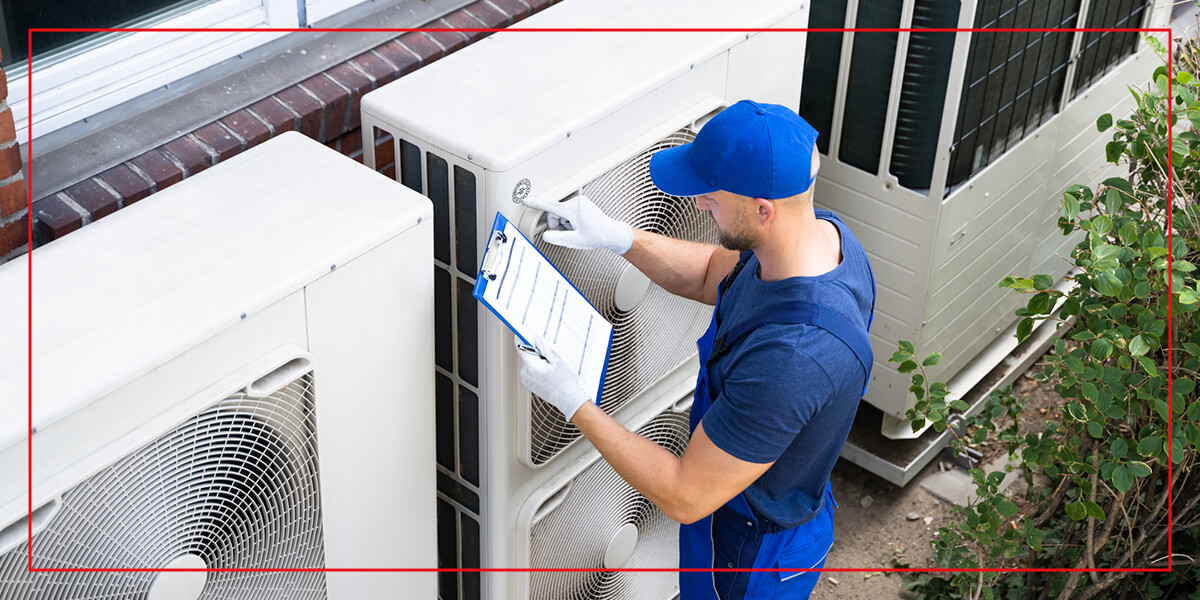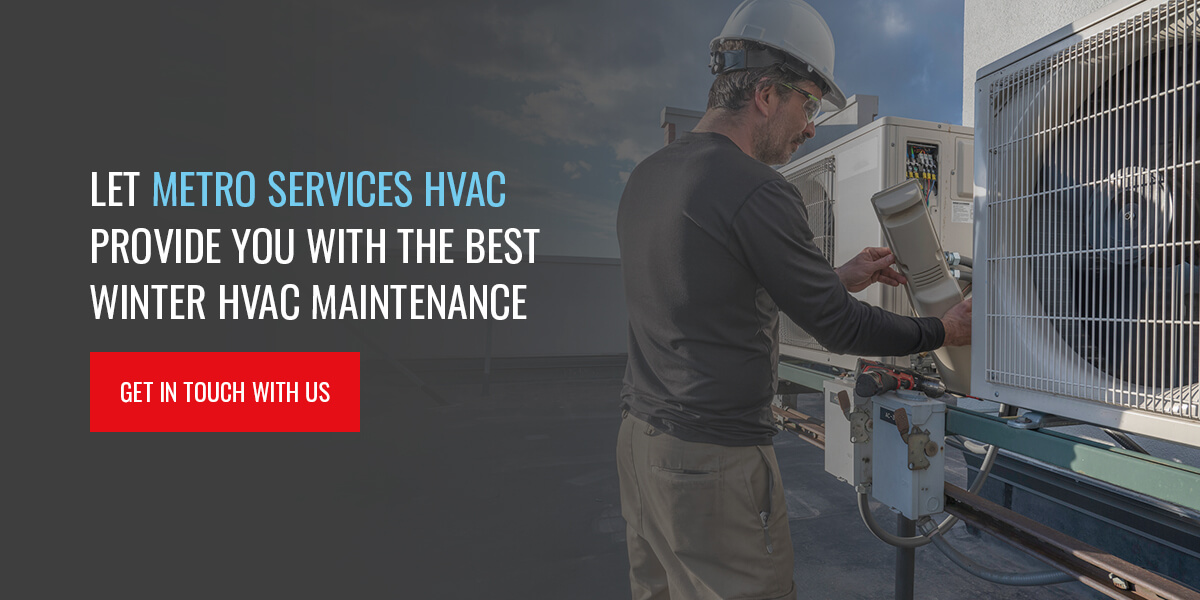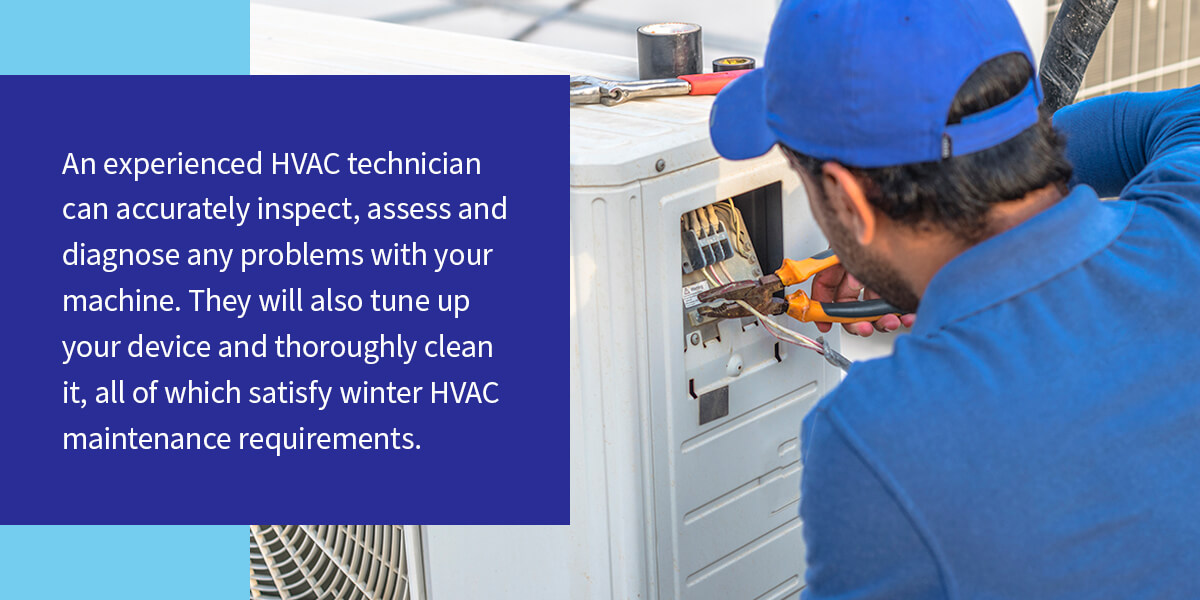Preventive HVAC Maintenance for the Winter

As the chill in the air increases during the winter, no one wants to turn on their HVAC and discover it’s not working as it should. After the warmer times of the year, it’s easy to forget how much we rely on our heating systems, and the last thing you want is to be stuck in a cold snap with a faulty machine and no heat. Preventive maintenance can help you keep the heat on when you need it most.
Although it’s always best to have a trusted and reliable technician conduct your HVAC winter maintenance, running some simple checks and ensuring everything is working is always a good idea.
How Often to Conduct Preventive HVAC Maintenance
Routine maintenance for the winter mitigates future problems in your heating system. Your HVAC manufacturing guide will give you the information specific to your machine, and it’s best to stick to these guidelines. As a general rule, you should conduct HVAC maintenance at least once a year before the cold weather sets in, probably toward the end of fall.
Routine HVAC Maintenance for the Winter
Your HVAC will be under more pressure as the temperatures plummet. Unpredictable weather in areas like Maryland means you might need your system at a moment’s notice. Here are some quick tips and tricks to use in conjunction with professional maintenance to ensure your HVAC is always ready to keep you toasty and warm
1. Replace the Filters
While you should schedule routine HVAC maintenance every six months, you must replace your filters every three months while your HVAC is in use. Dirty filters don’t sound too serious, but they impact the efficiency and longevity of your HVAC, which will escalate your energy bills. For a perfect heating experience, replace your filters at the start of the cold season to eliminate excess dust and other debris.
2. Fire It Up
Turn your furnace on at least once before the freezing temperatures come knocking on your door. Firing up your heater before the cold temperatures hit is an excellent way to determine whether there are any issues before it’s too late and you’re already freezing. A burning smell is normal when you turn your HVAC on for the first time but should dissipate after a while.
3. Listen for Strange Noises
When testing your heating system, please pay attention to its sound. Anything unusual could cause concern, so keep an ear out for rattling or banging, which is a definite sign that you need a professional to look at your equipment. Left untreated, that sound may damage your HVAC system beyond repair.
4. Program Your HVAC for Energy Saving
Blasting the heating won’t necessarily help you heat your home any faster, but it can drive up your energy bill. If you have a programmable thermostat, you can just set it for the winter months to keep your home warm even when you’re not there. If you set your thermostat early, you can make adjustments to suit your needs in time to be prepared for incoming cold snaps.
To prevent further energy loss, check your doors and windows for gaps that might let the warm air out. Air leaks can be expensive and may lead to running your HVAC overtime while the heat leaks into the open air.
5. Look for Moisture
The vent pipe should be clean of wet spots, rust or dirt. If you see an unusual build-up, it may be a sign that your HVAC system isn’t working at optimal levels. Please reach out to a licensed HVAC technician as soon as possible to help diagnose and fix the problem before it has lasting consequences.
6. Check the Electrical Connections and Registers
During your HVAC trial run, take a moment to check all the registers and make sure warm air is coming out at normal speed. Doing a check will help you ascertain whether there are any blockages in your system. If your registers are blocked in a specific area, you have a general idea of where the backup is so that you can tell your HVAC technician.
Preserve your heating system’s safety by ensuring no damage or corrosion to the electric wiring or circuits. Checking all the electrical connections on your HVAC is critical for fire safety. Even if you think something isn’t right, turning your heating system off is best until your HVAC technician has given you the all-clear.
7. Clean the Air Vents and Check the Ducts
When you vacuum your home, go over the air vents to suck up dust or debris that may clog your system.
If air leaks out of any ducts, have a licensed HVAC technician repair them without delay. Leaky ducts are wasteful and can interrupt the balance of airflow throughout your whole system, increasing wear and tear and possibly forcing you to replace your system.
8. Schedule an Inspection
You can do your part to keep your HVAC system functioning optimally, but a professional inspection will help you more than home maintenance options. An experienced HVAC technician can accurately inspect, assess and diagnose any problems with your machine. They will also tune up your device and thoroughly clean it, all of which satisfy winter HVAC maintenance requirements.
Licensed HVAC technicians have the skills and expertise to catch the small things that may lead to more significant and more expensive problems in the future, which is one of the reasons preventive maintenance is so essential to get the best from your HVAC system.
9. Request Necessary Repairs
If your system needs repairs, please try and book an HVAC technician as soon as possible and turn your system off to prevent further damage. Please ensure you find a reliable and good-quality technician to do the repairs. It’s worth doing your research here, as an unlicensed repairperson could do more harm than good.
10. Consider an Upgrade
With proper care and maintenance, your HVAC system can last decades. However, you might need to look into a new installation if your current system is different from what you’re looking for now or if you’re moving. The following factors will reveal if it’s time for an HVAC upgrade:
- Age: Your system is 10 years old or older.
- Repairs: Your system often needs fixing.
- Warm air: You’re not getting enough warm air anymore or the air quality has deteriorated.
- Maintenance: Your system hasn’t received regular maintenance.
 Let Metro Services HVAC Provide You With the Best Winter HVAC Maintenance
Let Metro Services HVAC Provide You With the Best Winter HVAC Maintenance
Whether you’re scheduling routine preventive maintenance, need emergency assistance or want to install a brand-new system, it doesn’t matter. Metro Services HVAC is here to help you. No matter the season, you can enjoy 24/7 service in Maryland and Washington, D.C. We provide affordable, quality, expert support. With Metro Services HVAC maintenance plans, you can cover your routine maintenance without the added hassle.
All our employees are trained experts who value you like family and provide you with an honest assessment of your situation — we’ll only do the work needed to fix the problem, no more and no less. Please get in touch with us for a free estimate and same-day service to make the most of over two decades of HVAC experience today.

